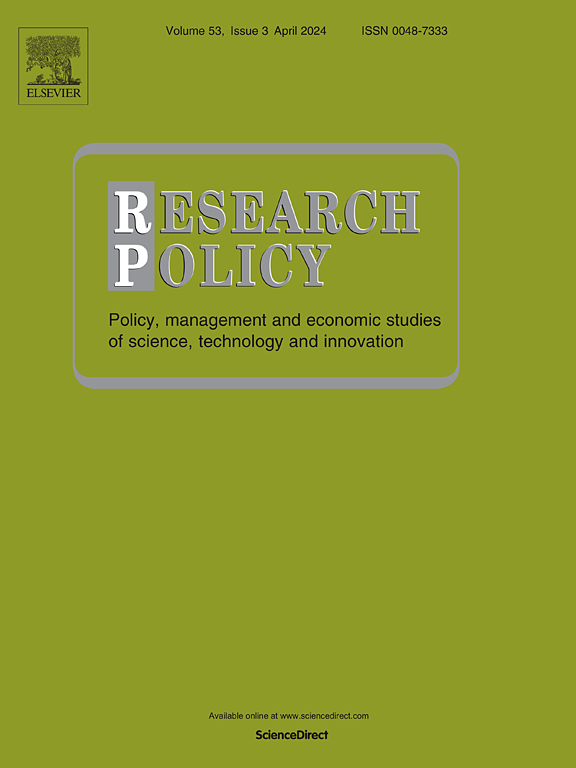学术创业中的性别多样性:社会影响动机和NSF I-corps项目
IF 8
1区 管理学
Q1 MANAGEMENT
引用次数: 0
摘要
本研究利用美国国家科学基金会创新队(NSF I-Corps)项目考察了学术创业在社会影响和商业动机方面的性别差异。I-Corps通过一个全国性的项目,为当地I-Corps大学的教职员工和研究生研究员提供体验式创业培训。自I-Corps成立以来,只有20%的参与者是女性。我们首先利用一个I-Corps大学网站的调查数据表明,与商业创业意愿相比,女性的社会创业意愿更高,而且她们的社会创业意愿高于男性。然后,我们通过分析2011年至2019年国家I-Corps计划的1267个公开项目摘要,扩展和概括了这一发现。我们发现女性pi的项目提案比男性更强调社会影响,而所有pi的项目都强调商业影响的程度相似。接下来,我们进行了一项实地实验,通过实验操纵邀请研究人员参加I-Corps培训计划的招聘电子邮件,来估计社会影响与商业动机的因果影响。我们发现,与商业信息相比,女性更有可能对具有社会影响的信息表现出兴趣,而男性对这两种类型的信息表现出同样的兴趣。综上所述,我们的研究结果表明,在解决社会问题时,女性对追求商业化和创业活动更感兴趣。他们认为,强调创业机会的社会影响价值的低成本干预措施可能会增加创业活动中的性别多样性。本文章由计算机程序翻译,如有差异,请以英文原文为准。
Gender diversity in academic entrepreneurship: Social impact motives and the NSF I-corps program
This study examines gender differences in the social impact and commercial motives for academic entrepreneurship using the National Science Foundation's Innovation Corps (NSF I-Corps) program. I-Corps provides experiential entrepreneurship training to faculty and graduate student researchers at local I-Corps university sites and through a nationwide program. Since the inception of I-Corps, only 20 % of participants have been women. We first use survey data from one I-Corps university site to show that women had higher social entrepreneurial intentions compared to commercial entrepreneurial intentions, and their social entrepreneurial intentions were higher than men's. We then extend and generalize this finding by analyzing 1267 publicly available project summaries from the National I-Corps Program from 2011 to 2019. We find that women PIs' project proposals emphasized social impact significantly more than men, while projects for all PIs emphasized commercial impact to a similar degree. We next ran a field experiment to estimate the causal impact of social impact vs. commercial motives by experimentally manipulating the recruitment email messages inviting researchers to participate in the I-Corps training program. We find that women were more likely to show interest in a social impact version of a message compared to a commercial version, while men showed equal interest in both types of messages. Taken together, our results indicate that women are more interested in pursuing commercialization and entrepreneurship activities when they are tackling societal problems. They suggest that low-cost interventions that emphasize the social impact value of entrepreneurial opportunities may increase gender diversity in entrepreneurship activities.
求助全文
通过发布文献求助,成功后即可免费获取论文全文。
去求助
来源期刊

Research Policy
MANAGEMENT-
CiteScore
12.80
自引率
6.90%
发文量
182
期刊介绍:
Research Policy (RP) articles explore the interaction between innovation, technology, or research, and economic, social, political, and organizational processes, both empirically and theoretically. All RP papers are expected to provide insights with implications for policy or management.
Research Policy (RP) is a multidisciplinary journal focused on analyzing, understanding, and effectively addressing the challenges posed by innovation, technology, R&D, and science. This includes activities related to knowledge creation, diffusion, acquisition, and exploitation in the form of new or improved products, processes, or services, across economic, policy, management, organizational, and environmental dimensions.
 求助内容:
求助内容: 应助结果提醒方式:
应助结果提醒方式:


